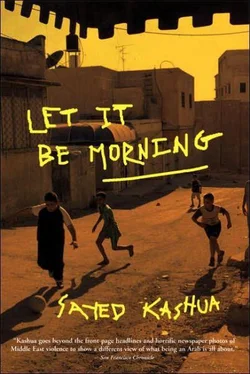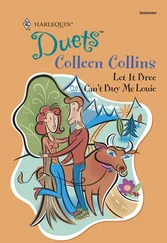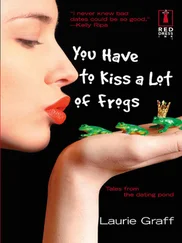“Nothing. Some idiot tried to run the roadblock.”
“The roadblock? It’s still there? You mean you won’t be going to work today either?”
“You’d better stay home too.”
“What do you mean? I can’t. But I only have five classes today. I’ll be home early. What will you do all day? How about cleaning up a bit?”
“Yeah, we’ll see. But I’d like the baby to stay with me today.”
“Great. She’ll love it. Won’t you, sweetheart? Won’t you? You’ll stay with Daddy.”
In a way I’m happy they’ve continued the roadblock today too. It sort of saves me from the useless trip to the paper and from aimlessly roaming the streets. On the other hand, what the hell is going on here?
The baby smiles and finishes the whole bottle. My wife hands her over to me and goes to the bathroom. I’m so sorry I have a little girl. What a fool I was to decide to bring a child into the world in a situation like this. It wasn’t just the roadblock and yesterday’s events, but generally it seemed to me really inhumane to bring children into a world like ours in a region like ours. The problem is that my wife got pregnant before the present Intifada broke out. Everything seemed different then, and my own way of thinking was different too. I can even say I was optimistic. My career was going well and relations between Arabs and Jews were beginning to improve. Sometimes I think it all happened because of the baby, as a kind of retribution. Religious people would say God was testing us. I try to smile at the baby, as if to convince her that everything’s fine, that she’s living in surroundings that are just the way I’d planned for her. When I think about how quickly things deteriorated, it’s mind-blowing.
I’d rather the three of us stayed together today. That’s how I am when I have a sense that things are dangerous — I like to see all the people that I worry about sticking together, but I don’t have the strength to explain to her about how frightened I am and to persuade her to stay home.
We’re walking together and she says good-bye to the baby, I tell her to take care of herself, follow her with my eyes till she’s out of sight and go into my parents’ home with the baby in my arms.
My parents are getting dressed to pay a condolence call. My father pays condolence calls every time anyone in the village dies. He and two other adults in the family are regarded as the official condolence callers, and for decades the three of them have paid these calls on the second day of the mourning, after evening prayers. When the death isn’t natural, or when the deceased is someone important, or when a friend or someone young dies in his prime, the three relatives modify their standard procedure and don’t wait for the second day but try to make it to the funeral as well. My mother wears a kerchief and attends too. When they reach the road, they split up — Mother joins the women and Father walks along with the men. Many men and women are walking toward the house, trying to keep quiet, speaking in a whisper, the men walking on the right side of the road and the women on the left. I feel kind of sorry that I can’t join the funeral procession, which is bound to set out from the homes of the parents — the contractor’s and the workers’—toward the mosque, and from there to the cemetery. Too bad I offered to take the baby, because it could certainly have added some human interest to the story I’ll write for the paper. I’m still convinced I’ll be covering the whole chain of events once the roadblock is removed. If the closure is lifted tomorrow, I may still get the story written in time for this weekend’s supplement.
When my mother gets back, I’ll give her the baby and go out to see what’s happening, how people are taking it. My younger brother is back home, holding two plastic bags so heavy he can barely lift them. “Mother’s gone crazy,” he says, dumping the bags on the kitchen counter. Mostly they’re full of canned goods, corn, tuna, pickles, beans, peas, ful, chickpeas. He says the store was packed and that he practically had to hit this older woman who tried to get ahead of him. He says there were loads of people there and that some of the things that Mother had ordered were sold out already. He couldn’t find any flour, for instance.
My brother takes a seat in the living room, first beside me, stroking the baby’s head and smiling at her. She smiles back. Then he sits on the sofa farthest from us, pulls out a pack of cigarettes and lights one. “So, the folks have gone to a funeral?” he asks.
“Yeah. Since when do you smoke?”
“For almost a year. You know how it is at university, don’t you?” He smiles and adds in a more serious voice, “What do you say? Should I bother studying? Do you think there’s any chance I’ll get back to Tel Aviv tomorrow?”
“Sure, you’ve got to study for the exam.”
He takes a puff at his cigarette and tells me that in the beginning, when the security service knocked at his door, he thought they were rounding up the students they considered problematic, the political activists, the ones who showed up at campus rallies. But with him in the police car were students who were so good that they always made a point of keeping out of politics and just focused on their studies. My brother’s description takes me by surprise. I have the feeling I hardly know him anymore. I’d never imagined him as a smoker, and now he tells me he’s a campus activist. “And in what party are you active?” I ask him.
“I’m with the Communists.”
“The Communists? And just how did you wind up with the Communists?”
“Well, you know how it is. You’ve been, haven’t you? You meet people. Your friends are active in the party, so you decide you want to be active too, but it’s mainly because of how they treated me. Suddenly I see our problems. Suddenly I understand what it means to be hated, what racism and discrimination are. In the dorms, they make sure you’re put into the Arabs’ rooms, which are the worst rooms there are. One room for Arabs on each floor, to make sure there aren’t too many of us in any one place, to keep us in a minority status even on the floor. You know how there’s a single refrigerator for each two rooms? Well, the day I got there, I went into the kitchen to get a compartment for myself and my roommate from Djat, and this Jewish guy asked if I’d share a compartment with him. He said it was lucky I’d come because he was so worried he’d wind up having to share with an Arab.”
With my younger brother it’s hard to tell what he is, especially with his ponytail and his hard-rock clothes. Like most of the young people who join the Communist Party, my brother doesn’t know the first thing about Communism. They know it’s a party that aims at equality between Jews and Arabs, between the poor and the rich, but they haven’t a clue about its principles. We continue talking and I try to find out more about his Communism. I discover he knows who Lenin was but he’s never heard of Trotsky. He can curse the capitalists but knows nothing about the concept of a proletariat or the distribution of capital. The Communist slogans suited him, there were a few guys there from the law faculty where he studies, and that’s why he chose the Communists. He adds that there are some really cool Christian girls from the Galilee there too, not afraid to smoke in front of everyone, dressing right and joining the guys for a beer. It’s not that my younger brother is dumb. Not at all. He’s smart, and someday he’ll learn to tell the difference between them all. I don’t think I understood much about the different parties at his age either, or just what the conflict is all about. My brother asks me not to say a word to Father, ’cause he’ll kill him. Father’s motto has always been that if you want to amount to anything and if you want to do well at school, you’ve got to stay away from politics. Girls and politics. He makes me swear not to mention the cigarettes either, because Father is liable to make him stop school and come back home. I tell him he’s exaggerating, but promise not to say anything. My younger brother goes back to his studies, the baby begins to cry.
Читать дальше












